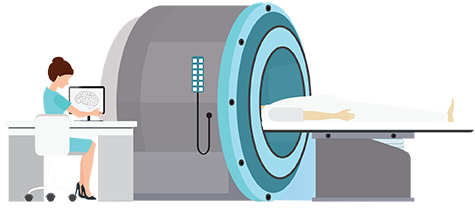

Radiology is a versatile technology used in diverse health care settings such as hospitals, outpatient imaging centers, physicians’ private practices, and even veterinary clinics. Many variations of basic X-ray machines have been developed, expanding the use of this technology and opportunities for professionals in the field.
Radiology schools provide training programs and specializations in diagnostic imaging technology. This involves X-rays, CT scans, or MRIs. While magnetic resonance imaging (MRI) machines are massive devices that require super-cooled liquids to keep the machines cooled, and require entire rooms to safely house them, X-ray machines are the oldest and simplest machines to work with; some machines are even attached to mobile devices.
According to the U.S. Bureau of Labor statistics, most states require practicing X-ray technicians to be licensed. Licensing in most states requires a certification exam either from the state or from the American Registry of Radiologic Technologists (ARRT), the BLS reports. If you plan on being employed as a Radiologic Technologist — a licensed position and title — make sure your school is accredited by an accreditation agency approved by the ARRT.
There are non-degree level courses that award certificates or diplomas in radiology, but ARRT policy is to accept only students who have obtained either an associate or bachelor’s degree in addition to completing a radiological educational program. The degree does not need to be in a radiological field, however, students are required to have completed the needed academic coursework prior to certification.
AART certification requires completing a degree program within a certain time frame, taking and passing the ARRT certification test, and meeting the ARRT’s ethical standards. Keep in mind that program requirements and prerequisites tend to change, so check the ARRT website to find the most current info.
X-ray technician schools offer a wide variety of specializations or programs focusing on diagnostic imaging. X-rays have been used to peer into a body, since the first X-rays were taken in 1896. Since then, more uses have been found for X-rays besides identifying broken bones, for example:
Using an X-ray machine is more advanced today than it has been at any point in the past, with more specialty options available for X-ray technicians both during the training program and in a professional career. The Bureau of Labor Statistics suggests there may be good opportunities for those qualified to work in different specializations.
Due to the hands-on nature of training in X-ray technology and techniques, online programs are usually not approved for certification. However, online studies are an option for practicing professionals looking to polish their skills. Many states mandate continuing education (CE) for licensed radiological technicians, and the ARRT requires registered technicians to receive CE each year. These programs may be available either partially or entirely through online programs.
Additionally, if you have some experience working as an X-ray technologist or in a related field in radiographic health care, you may meet the prerequisites for online X-ray tech programs designed specifically for individuals working in what is known as a “limited scope X-ray” capacity, who wish to earn a degree. Often, these certificates or degrees are named “fast track radiology” programs because they assume you already have some of the basic skills and knowledge to expand on.